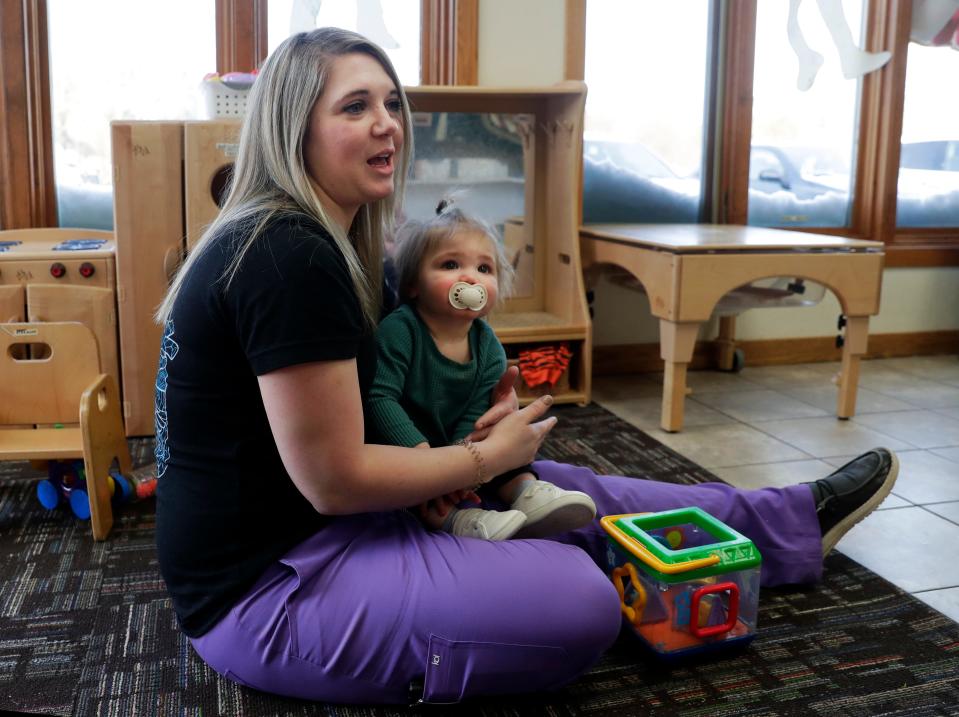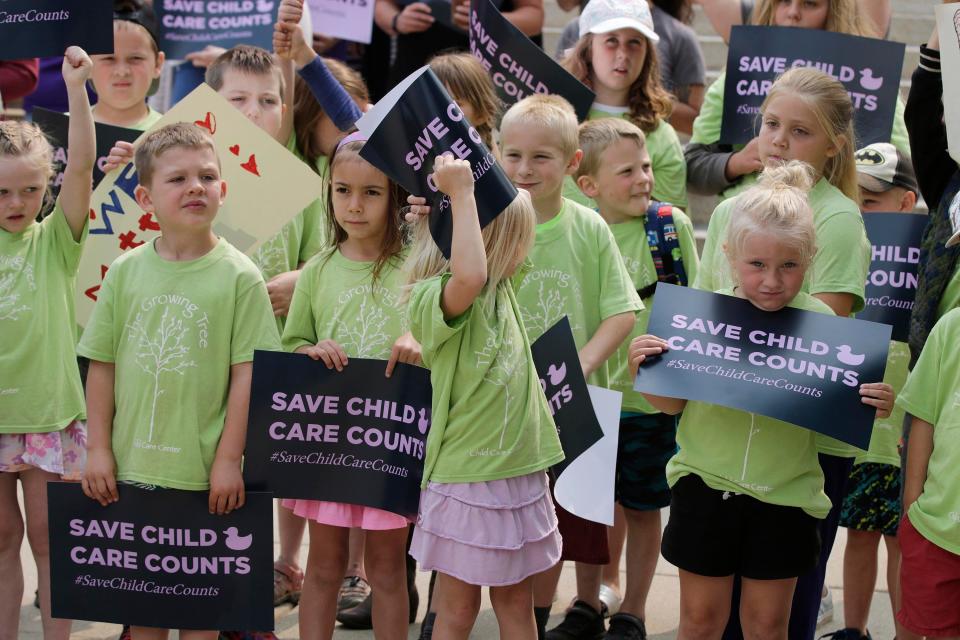Child care providers, parents, happy with Wisconsin Gov. Evers’ extension of funds for Child Care Counts
- Oops!Something went wrong.Please try again later.
Much of Wisconsin's child care industry is celebrating after Gov. Tony Evers recently directed $170 million in emergency funding to continue Child Care Counts, a program credited with keeping thousands of child care businesses open through the pandemic. The program had been scheduled to end in January.
Evers' announcement that Child Care Counts will continue through June 2025 came Monday, after Republicans repeatedly rejected Evers' and other Democrats' calls to direct additional funding to continue the program.
Republican legislators came up with their own plans, some of which are outlined in a package of bills, to bolster child care. With such rebuffs, child care providers were bracing for Child Care Counts to end come the new year, as the federal pandemic-relief dollars that fund it run out.
Evers said much of the $170 million he is devoting to the program is from reimbursements on pandemic response operations Wisconsin received from the Federal Emergency Management Agency and underspent funds previously allocated for pandemic response needs.
While the additional funding is welcomed by child care providers and other industry experts across Wisconsin, they — and Evers — acknowledge it is not nearly enough to fully tackle Wisconsin's child care crisis.
Here's what to know about how this new funding allocation will affect the child care industry and Wisconsin families.
More: Gov. Tony Evers announces $170M in 'emergency funding' to extend Child Care Counts
What does this decision mean for child care programs?
For some child care providers, the continuation of Child Care Counts means they no longer fear having to close their programs.
"That money is kind of like a parachute that is strapped on your back when you are halfway between the airplane and the earth," said Shasta Westaby, who runs Just Playing Child Care out of her Rice Lake home. "It will keep me from having to shut down."
The funding allows Westaby to continue to serve children with high needs, as she can keep her program size small and afford the equipment and supplies necessary to serve these children.
However, Westaby cautioned that because the $170 million is only half of what advocates asked for to continue Child Care Counts, some providers may still decide to close. But she expects fewer providers to close than if the program completely ceased.
A fall 2022 survey of child care providers by the National Association for the Education of Young Children revealed over 33% of Wisconsin respondents would need to cut wages if Child Care Counts ended. This could further worsen the field's staffing shortages and ultimately reduce quality care options statewide, said Corrine Hendrickson, who operates Corrine's Little Explorers out of her New Glarus home. Hendrickson also co-founded the grassroots advocacy organization Wisconsin Early Childhood Action Needed.
In the same survey, over 60% of responding Wisconsin child care center directors said they would have to raise their tuition if Child Care Counts were to end.
More: Struggling to afford child care in Wisconsin? Here's where to find help.
Like many providers, Hendrickson increased her rates after Child Care Counts payments were reduced beginning in May, and was planning to increase rates by about $30 a week per child in February if Child Care Counts ended completely.
With Monday's announcement, Hendrickson was able to tell families they would not need to shoulder another substantial rate increase in the new year.
What does this decision mean for families?
New Glarus' Abby Funseth, whose 4½-year-old and 15-month-old children attend Corrine's Little Explorers, is relieved another large tuition increase isn't on the horizon. The future of Corrine's Little Explorers was uncertain without the promise of Child Care Counts, which made Funseth nervous.
"It was stressful to think about the future without Corrine, without her daycare facility, and it was sad, too," Funseth said. "We don't want to lose her because she can't get funding from the government. This whole experience is shaping the future of our family."

Even now, the high cost of child care and lack of quality care affects families’ choices. Recently, a family withdrew their child from Just Playing Child Care, Westaby said, after determining it would be more financially viable for one parent to leave their job to be home full time with their child, rather than to pay for child care.
Some families limit the number of children they have, or decide to wait longer between children. Funseth even timed the conception of her second child around a child care opening.
If Child Care Counts were to end, further driving up the cost of care and exacerbating the shortage of quality care, such decisions would become more commonplace, Hendrickson said.
How does Child Care Counts help the industry?
Between its inception in May 2020 and this summer, Child Care Counts distributed more than $630 million in federal pandemic relief funds to about 5,000 Wisconsin child care providers, according to the Wisconsin Department of Children and Families.

A WECAN survey of over 500 child care providers showed, on average, Child Care Counts funding makes up 25% of a child care business’ revenue.
As DCF testified in a Senate committee hearing last week, Child Care Counts funding enabled many child care providers to increase wages. Still, at $12.66 per hour, the 2022 average wage for a Wisconsin child care worker was well below that of most other professions with similar education requirements, according to the U.S. Bureau of Labor Statistics.
Many providers also used the funding to make long-delayed facility improvements, increase the quality of their programs, and prevent their families from seeing steep tuition increases. Ashland's Tree Top Child Development Center and Preschool families actually had its tuition frozen for roughly two years, until September 2022, because of Child Care Counts and other pandemic-era supports.
If devoting $170 million to child care won't completely fix Wisconsin's child care crisis, what will?
Evers — along with many early education providers and other experts — acknowledges the problems plaguing Wisconsin's child care system are too large to be quelled with temporary funding alone.
Evers said allocating money in the state's budget to child care can help prompt sustainable solutions.
“We’re fortunate to have this, but it’s not a solution by any chance,” Evers said. “It’s going to be one-time money, and we’re going to be faced at the end of the biennium with, what do we do now? And by that time, we will already have started to lose child care providers.”
On Tuesday, the Senate passed a bill that includes a provision to establish a state child care tax credit. Evers is likely to veto the bill if it passes in the Assembly. Separately, a package of GOP bills also relating to child care, which include changing regulations in hopes of creating more child care slots and creating a revolving loan fund for providers, received a public hearing Wednesday in a Senate committee.
More: Senators voted on a $2B tax cut, abortions and adoptions. What to know about a whirlwind session
In a previous public hearing by an Assembly committee, some in the child care industry voiced safety concerns over the proposed regulation changes and said the bills fail to address industry-wide low wages. Others appreciated the options the bills would give providers.
Tree Top's owner, director and preschool teacher, Theresa Fredericks, and Beverly Anderson, executive director of the Milwaukee-area's Ebenezer Child Care Centers, said that while there are multiple opinions about how to fix the child care crisis, true change can only occur if society shifts its perception of early childhood education.
“Why do we (only) invest in children when they are 5 years old and going to school? Why are we not caring about birth to 5?” Fredericks said. “We need to care about the children at all ages, especially now because those first five years are so important. Everybody should be able to have access to quality care.”
Related: Wisconsin is altering its child care subsidy program. Here’s what families need to know.
Madison Lammert is a Report for America corps member who covers child care and early education in Wisconsin at The Post-Crescent. Contact her at mlammert@gannett.com or 920-993-7108. Follow on Twitter @MadisonLammert0.
You can directly support her work with a tax-deductible donation online at http://bit.ly/Appleton_RFA or by check made out to The GroundTruth Project with subject line Report for America Post Crescent Campaign. Address: The GroundTruth Project, Lockbox Services, 9450 SW Gemini Dr, PMB 46837, Beaverton, Oregon 97008-7105.
This article originally appeared on Appleton Post-Crescent: Child Care Counts funding a step toward resolving child care crisis

